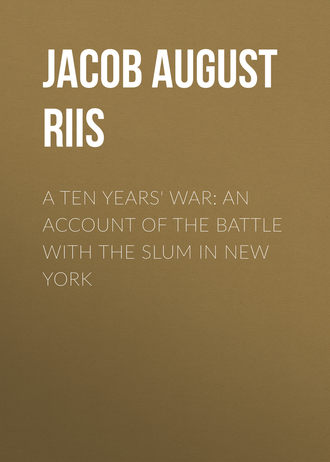 полная версия
полная версияA Ten Years' War: An Account of the Battle with the Slum in New York
It will continue to be in the way. A man who has one lot will build on it: it is his right. The state, which taxes his lot, has no right to confiscate it by forbidding him to make it yield him an income, on the plea that he might build something which would be a nuisance. But it can so order the building that it shall not be a nuisance: that is not only its right, but its duty. The best which can be made out of a twenty-five-foot lot is not good, but even that has not been made out of it yet. I have seen plans drawn by two young women architects in this city, the Misses Gannon and Hands, and approved by the Building Department, which let in an amount of light and air not dreamed of in the conventional type of double-decker, while providing detached stairs in a central court. It was not pretended that it was an ideal plan,—far from it; but it indicated clearly the track to be followed in dealing with the twenty-five-foot lot, seeing that we cannot get rid of it. The demand for light and air space must be sharpened and rigidly held to, and "discretion" to cut it down on any pretext must be denied, to the end of discouraging at least the building of double-deckers by the speculative landlord who has more than one lot, but prefers to build in the old way, in order that he may more quickly sell his houses, one by one.
With much evidence to the contrary in the big blocks of tenements that are going up on every hand, I think still we are tending in the right direction. I come oftener, nowadays, upon three tenements built on four lots, or two on three lots, than I used to. Indeed, there was a time when such a thing would have been considered wicked waste, or evidence of unsound mind in the builder. Houses are built now, as they were then, for profit. The business element must be there, or the business will fail. Philanthropy and five per cent. belong together in this field; but there is no more reason for allowing usurious interest to a man who makes a living by providing houses for the poor than for allowing it to a lender of money on security. In fact, there is less; for the former draws his profits from a source with which the welfare of the commonwealth is indissolubly bound up. The Tenement House Committee found that the double-deckers yield the landlord an average of ten per cent., attack the home, and are a peril to the community. Model tenements pay a safe five per cent., restore the home, and thereby strengthen the community. It comes down, then, as I said, to a simple question of the per cent. the builder will take. It should help his choice to know, as he cannot now help knowing, that the usurious profit is the price of good citizenship and human happiness, which suffer in the proportion in which the home is injured.
The problem of rent should be solved by the same formula, but not so readily. In the case of the builder the state can add force to persuasion, and so urge him along the path of righteousness. The only way to reach the rent collector would be for the municipality to enter the field as a competing landlord. Doubtless relief could be afforded that way. The Tenement House Committee found that the slum landlord charged the highest rents, sometimes as high as twenty-five per cent. He made no repairs. Model tenement house rents are lower, if anything, than those of the double-decker, with more space and better accommodations. Such a competition would have to be on a very large scale, however, to avail, and I am glad that New York has shown no disposition to undertake it yet. I would rather we, as a community, learned first a little more of the art of governing ourselves without scandal. Present relief from the burden that taxes the worker one fourth of his earnings for a roof over his head must be sought in the movement toward the suburbs that will follow the bridging of our rivers, and real rapid transit. On the island rents will always remain high, on account of the great land values. But I have often thought that if the city may not own new tenements, it might with advantage manage the old to the extent of licensing them to contain so many tenants on the basis of the air space, and no more. The suggestion was made when the tenement house question first came up for discussion, thirty years ago, but it was rejected then. The same thing is now proposed for rooms and workshops, as the means of getting the best of the sweating nuisance. Why not license the whole tenement, and with the money collected in the way of fees pay for the supervision of them by night and day? The squad of sanitary policemen now comprises for the Greater City some ninety men. Forty-one thousand tenements in the Borough of Manhattan alone, at three dollars each for the license, would pay the salaries of the entire body, and leave a margin. Seeing that their services are going exclusively to the tenements, it would not seem to be an unfair charge upon the landlords.
The home is the key to good citizenship. Unhappily for the great cities, there exists in them all a class that has lost the key or thrown it away. For this class, New York, until three years ago, had never made any provision. The police station lodging rooms, of which I have spoken, were not to be dignified by the term. These vile dens, in which the homeless of our great city were herded, without pretense of bed, of bath, of food, on rude planks, were the most pernicious parody on municipal charity, I verily believe, that any civilized community had ever devised. To escape physical and moral contagion in these crowds seemed humanly impossible. Of the innocently homeless lad they made a tramp by the shortest cut. To the old tramp they were indeed ideal provision, for they enabled him to spend for drink every cent he could beg or steal. With the stale beer dive, the free lunch counter, and the police lodging room at hand, his cup of happiness was full. There came an evil day, when the stale beer dive shut its doors and the free lunch disappeared for a season. The beer pump, which drained the kegs dry and robbed the stale beer collector of his ware, drove the dives out of business; the Raines law forbade the free lunch. Just at this time Theodore Roosevelt shut the police lodging rooms, and the tramp was literally left out in the cold, cursing reform and its fruits. It was the climax of a campaign a generation old, during which no one had ever been found to say a word in defense of these lodging rooms; yet nothing had availed to close them.
The city took lodgers on an old barge in the East River, that winter, and kept a register of them. We learned something from that. Of nearly 10,000 lodgers, one half were under thirty years old and in good health,—fat, in fact. The doctors reported them "well nourished." Among 100 whom I watched taking their compulsory bath, one night, only two were skinny; the others were stout, well-fed men, abundantly able to do a man's work. They all insisted that they were willing, too; but the moment inquiries began with a view of setting such to work as really wanted it, and sending the rest to the island as vagrants, their number fell off most remarkably. From between 400 and 500 who had crowded the barge and the pier sheds, the attendance fell on March 16, the day the investigation began, to 330, on the second day to 294, and on the third day to 171; by March 21 it had been cut down to 121. The problem of the honestly homeless, who were without means to pay for a bed even in a ten-cent lodging house, and who had a claim upon the city by virtue of residence in it, had dwindled to surprisingly small proportions. Of 9386 lodgers, 3622 were shown to have been here less than sixty days, and 968 less than a year. The old mistake, that there is always a given amount of absolutely homeless destitution in a city, and that it is to be measured by the number of those who apply for free lodging, had been reduced to a demonstration. The truth is that the opportunity furnished by the triple alliance of stale beer, free lunch, and free lodging at the police station was the open door to permanent and hopeless vagrancy.
A city lodging house was established, with decent beds, baths, and breakfast, and a system of investigation of the lodger's claim that is yet to be developed to useful proportions. The link that is missing is a farm school, for the training of young vagrants to habits of industry and steady work, as the alternative of the workhouse. Efforts to forge this link have failed so far, but in the good time that is coming, when we shall have learned the lesson that the unkindest thing that can be done to a young tramp is to let him go on tramping, and when magistrates shall blush to discharge him on the plea that "it is no crime to be poor in this country," they will succeed, and the tramp also we shall then have "druv into decency." When I look back now to the time, ten or fifteen years ago, when, night after night, with every police station filled, I found the old tenements in the "Bend" jammed with a reeking mass of human wrecks that huddled in hall and yard, and slept, crouching in shivering files, all the way up the stairs to the attic, it does seem as if we had come a good way, and as if all the turmoil and the bruises and the fighting had been worth while.
IV
THE TENANT
We have considered the problem of the tenement. Now about the tenant. How much of a problem is he? And how are we to go about solving his problem?
The government "slum inquiry," of which I have spoken before, gave us some facts about him. In New York it found 62.58 per cent. of the population of the slum to be foreign-born, whereas for the whole city the percentage of foreigners was only 43.23. While the proportion of illiteracy in all was only as 7.69 to 100, in the slum it was 46.65 per cent. That, with nearly twice as many saloons to a given number, there should be three times as many arrests in the slum as in the city at large need not be attributed to nationality, except indirectly in its possible responsibility for the saloons. I say "possible" advisedly. Anybody, I should think, whose misfortune it is to live in the slum might be expected to find in the saloon a refuge. I shall not quarrel with the other view of it. I am merely stating a personal impression. The fact that concerns us here is the great proportion of the foreign-born. Though the inquiry covered only a small section of a tenement district, the result may be accepted as typical.
We shall not, then, have to do with an American element in discussing this tenant, for even of the "natives" in the census, by far the largest share is made up of the children of the immigrant. Indeed, in New York only 4.77 per cent. of the slum population canvassed were shown to be of native parentage. The parents of 95.23 per cent. had come over the sea, to better themselves, it may be assumed. Let us see what they brought us, and what we have given them in return.
The Italians were in the majority where this census taker went. They were from the south of Italy, avowedly the worst of the Italian immigration which in the eight years from 1891 to 1898 gave us more than half a million of King Humbert's subjects. The exact number, as registered by the Emigration Bureau, was 502,592. In 1898, 58,613 came over, 36,086 of them with New York as their destination. The official year ends with June. In the six months from July 1 to December 31, the immigrants were sorted out upon a more intelligent plan than previously. The process as applied to the 30,470 Italians who were landed during that term yielded this result: from northern Italy, 4762; from southern Italy, 25,708. Of these latter a number came from Sicily, the island of the absentee landlord, where peasants die of hunger. I make no apology for quoting here the statement of an Italian officer, on duty in the island, to a staff correspondent of the "Tribuna" of Rome, a paper not to be suspected of disloyalty to United Italy. I take it from the "Evening Post:"—
"In the month of July I stopped on a march by a threshing floor where they were measuring grain. When the shares had been divided, the one who had cultivated the land received a single tumolo (less than a half bushel). The peasant, leaning on his spade, looked at his share as if stunned. His wife and their five children were standing by. From the painful toil of a year this was what was left to him with which to feed his family. The tears rolled silently down his cheeks."
These things occasionally help one to understand. Over against this picture there arises in my memory one from the Barge Office, where I had gone to see an Italian steamer come in. A family sat apart, ordered to wait by the inspecting officer; in the group an old man, worn and wrinkled, who viewed the turmoil with the calmness of one having no share in it. The younger members formed a sort of bulwark around him.
"Your father is too old," said the official.
Two young women and a boy of sixteen rose to their feet at once. "Are not we young enough to work for him?" they said. The boy showed his strong arms.
It is charged against this Italian immigrant that he is dirty, and the charge is true. He lives in the darkest of slums, and pays rent that ought to hire a decent flat. To wash, water is needed; and we have a law which orders tenement landlords to put it on every floor, so that their tenants may have the chance. And it is not yet half a dozen years since one of the biggest tenement house landlords in the city, the wealthiest church corporation in the land, attacked the constitutionality of this statute rather than pay a couple of hundred dollars for putting water into two old buildings, as the Board of Health had ordered, and came near upsetting the whole structure of tenement house law upon which our safety depends. He is ignorant, it is said, and that charge is also true. I doubt if one of the family in the Barge Office could read or write his own name. Yet would you fear especial danger to our institutions, to our citizenship, from these four? He lives cheaply, crowds, and underbids even the Jew in the sweatshop. I can myself testify to the truth of these statements. Only this spring I was the umpire in a quarrel between the Jewish tailors and the factory inspector whom they arraigned before the Governor on charges of inefficiency. The burden of their grievance was that the Italians were underbidding them in their own market, which of course the factory inspector could not prevent. Yet, even so, the evidence is not that the Italian always gets the best of it. I came across a family once working on "knee-pants." "Twelve pants, ten cents," said the tailor, when there was work. "Ve work for dem sheenies," he explained. "Ven dey has work, ve gets some; ven dey hasn't, ve don't." He was an unusually gifted tailor as to English, but apparently not as to business capacity. In the Astor tenements, in Elizabeth Street, where we found forty-three families living in rooms intended for sixteen, I saw women finishing "pants" at thirty cents a day. Some of the garments were of good grade, and some of poor; some of them were soldiers' trousers, made for the government; but whether they received five, seven, eight, or ten cents a pair, it came to thirty cents a day, except in a single instance, in which two women, sewing from five in the morning till eleven at night, were able, being practiced hands, to finish forty-five "pants" at three and a half cents a pair, and so made together over a dollar and a half. They were content, even happy. I suppose it seemed wealth to them, coming from a land where a Parisian investigator of repute found three lire (not quite sixty cents) per month a girl's wages.
I remember one of those flats, poor and dingy, yet with signs of the instinctive groping toward orderly arrangement which I have observed so many times, and take to be evidence that in better surroundings much might be made of these people. Clothes were hung to dry on a line strung the whole length of the room. Upon couches by the wall some men were snoring. They were the boarders. The "man" was out shoveling snow with the midnight shift. By a lamp with brown paper shade, over at the window, sat two women sewing. One had a baby on her lap. Two sweet little cherubs, nearly naked, slept on a pile of unfinished "pants," and smiled in their sleep. A girl of six or seven dozed in a child's rocker between the two workers, with her head hanging down on one side; the mother propped it up with her elbow as she sewed. They were all there, and happy in being together even in such a place. On a corner shelf burned a night lamp before a print of the Mother of God, flanked by two green bottles, which, seen at a certain angle, made quite a festive show.
Complaint is made that the Italian promotes child labor. His children work at home on "pants" and flowers at an hour when they ought to have been long in bed. Their sore eyes betray the little flower-makers when they come tardily to school. Doubtless there are such cases, and quite too many of them; yet, in the very block which I have spoken of, the investigation conducted for the Tenement House Committee by the University Department of Sociology of Columbia College, under Professor Franklin H. Giddings, discovered of 196 children of school age only 23 at work or at home, and in the next block only 27 out of 215. That was the showing of the foreign population all the way through. Of 225 Russian Jewish children only 15 were missing from school, and of 354 little Bohemians only 21. The overcrowding of the schools and their long waiting lists occasionally furnished the explanation why they were not there. Professor Giddings reported, after considering all the evidence: "The foreign-born population of the city is not, to any great extent, forcing children of legal school age into money-earning occupations. On the contrary, this population shows a strong desire to have its children acquire the common rudiments of education. If the city does not provide liberally and wisely for the satisfaction of this desire, the blame for the civic and moral dangers that will threaten our community, because of ignorance, vice, and poverty, must rest on the whole public, not on our foreign-born residents." It is satisfactory to know that the warning has been heeded, and that soon there will be schools enough to hold all the children who come. Now, since September 1, 1899, the new factory law reaches also the Italian flowermaker in his home, and that source of waste will be stopped.
He is clannish, this Italian; he gambles and uses a knife, though rarely on anybody not of his own people; he "takes what he can get," wherever anything is free, as who would not, coming to the feast like a starved wolf? There was nothing free where he came from. Even the salt was taxed past a poor man's getting any of it. Lastly, he buys fraudulent naturalization papers, and uses them. I shall plead guilty for him to every one of these counts. They are all proven. Gambling is his besetting sin. He is sober, industrious, frugal, enduring beyond belief, but he will gamble on Sunday and quarrel over his cards, and when he sticks his partner in the heat of the quarrel, the partner is not apt to tell. He prefers to bide his time. Yet there has lately been evidence once or twice in the surrender of an assassin by his countrymen that the old vendetta is being shelved, and a new idea of law and justice is breaking through. As to the last charge: our Italian is not dull. With his intense admiration for the land where a dollar a day waits upon the man with a shovel, he can see no reason why he should not accept the whole "American plan" with ready enthusiasm. It is a good plan. To him it sums itself up in the statement: a dollar a day for the shovel; two dollars for the shovel with a citizen behind it. And he takes the papers and the two dollars.
He came here for a chance to live. Of politics, social ethics, he knows nothing. Government in his old home existed only for his oppression. Why should he not attach himself with his whole loyal soul to the plan of government in his new home that offers to boost him into the place of his wildest ambition, a "job on the streets,"—that is, in the Street-Cleaning Department,—and asks no other return than that he shall vote as directed? Vote! Not only he, but his cousins and brothers and uncles will vote as they are told, to get Pietro the job he covets. If it pleases the other man, what is it to him for whom he votes? He is after the job. Here, ready-made to the hand of the politician, is such material as he never saw before. For Pietro's loyalty is great. As a police detective, one of his own people, once put it to me: "He got a kind of an idea, or an old rule: an eye for an eye; do to another as you'd be done by; if he don't squeal on you, you stick by him, no matter what the consequences." This "kind of an idea" is all he has to draw upon for an answer to the question if the thing is right. But the question does not arise. Why should it? Was he not told by the agitators whom the police jailed at home that in a republic all men are made happy by means of the vote? And is there not proof of it? It has made him happy, has it not? And the man who bought his vote seems to like it. Well, then?
Very early Pietro discovered that it was every man for himself, in the chase of the happiness which this powerful vote had in keeping. He was robbed by the padrone—that is, the boss—when he came over, fleeced on his steamship fare, made to pay for getting a job, and charged three prices for board and lodging and extras while working in the railroad gang. The boss had a monopoly, and Pietro was told that it was maintained by his "divvying" with some railroad official. Rumor said, a very high-up official, and that the railroad was in politics in the city; that is to say, dealt in votes. When the job gave out, the boss packed him into the tenement he had bought with his profits on the contract; and if Pietro had a family, told him to take in lodgers and crowd his flat, as the Elizabeth Street tenements were crowded, so as to make out the rent, and to never mind the law. The padrone was a politician, and had a pull. He was bigger than the law, and it was the votes he traded in that did it all. Now it was Pietro's turn. With his vote he could buy what to him seemed wealth. In the muddle of ideas, that was the one which stood out. When citizen papers were offered him for $12.50, he bought them quickly, and got his job on the street.
It was the custom of the country. If there was any doubt about it, the proof was furnished when Pietro was arrested through the envy and plotting of the opposition boss last fall. Distinguished counsel, employed by the machine, pleaded his case in court. Pietro felt himself to be quite a personage, and he was told that he was safe from harm, though a good deal of dust might be kicked up; because, when it came down to that, both the bosses were doing the same kind of business. I quote from the report of the State Superintendent of Elections of January, 1899: "In nearly every case of illegal registration, the defendant was represented by eminent counsel who were identified with the Democratic organization, among them being three assistants to the Corporation counsel. My deputies arrested Rosario Calecione and Giuseppe Marrone, both of whom appeared to vote at the fifth election district of the Sixth Assembly District; Marrone being the Democratic captain of the district, and, it was charged, himself engaged in the business of securing fraudulent naturalization papers. In both of these cases Farriello had procured the naturalization papers for the men for a consideration. They were subsequently indicted. Marrone and Calecione were bailed by the Democratic leader of the Sixth Assembly District."
The business, says the State Superintendent, is carried on "to an enormous extent." It appears, then, that Pietro has already "got on to" the American plan as the slum presented it to him, and has in good earnest become a problem. I guessed as much from the statement of a Tammany politician to me, a year ago, that every Italian voter in his district got his "old two" on election day. He ought to know, for he held the purse. Suppose, now, we speak our minds as frankly, for once, and put the blame where it belongs. Will it be on Pietro? And upon this showing, who ought to be excluded, when it comes to that?
The slum census taker did not cross the Bowery. Had he done so, he would have come upon the refugee Jew, the other economic marplot of whom complaint is made with reason. If his Nemesis has overtaken him in the Italian, certainly he challenged that fate. He did cut wages by his coming. He was starving, and he came in shoals. In fourteen years more than 400,000 Jewish immigrants have landed in New York.3 They had to have work and food, and they got both as they could. In the strife they developed qualities that were anything but pleasing. They herded like cattle. They had been so herded by Christian rulers, a despised and persecuted race, through the centuries. Their very coming was to escape from their last inhuman captivity in a Christian state. They lied, they were greedy, they were charged with bad faith. They brought nothing,—neither money nor artisan skill,—nothing but their consuming energy, to our land, and their one gift was their greatest offense. One might have pointed out that they had been trained to lie, for their safety; had been forbidden to work at trades, to own land; had been taught for a thousand years, with the scourge and the stake, that only gold could buy them freedom from torture. But what was the use? The charges were true. The Jew was—he still is—a problem of our slum.









